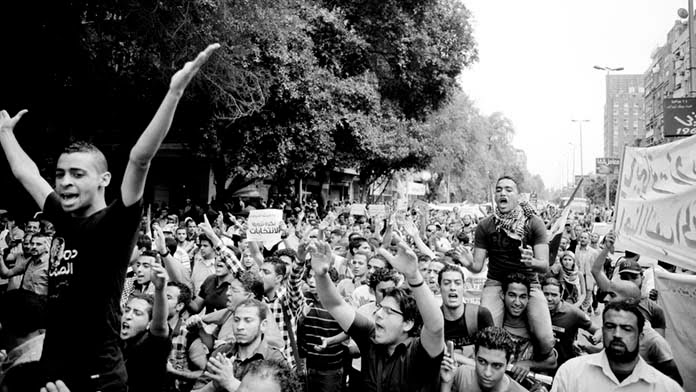Radical parties that have tried to introduce sweeping change through parliament have continually failed, argues James Supple, because the system is set up to stop them
Capitalism is producing global catastrophe.
Brutal and bloody wars are increasing common—not just through military coups in places like Sudan and Myanmar but between major world powers in Ukraine. The US, Australia and the West are arming Israel as it carries out genocide in Gaza and threatens to spread war across the whole Middle East.
A handful of billionaires and the super-rich reveal massive inequality. Jeff Bezos can waste $5.5 billion on a trip to space while one in ten people on Earth face chronic hunger. Even in a rich country like Australia, governments are refusing to address the out of control housing and cost of living crisis.
And even as we face catastrophic levels of warming our rulers allow the extraction of coal, oil and gas to continue unchecked.
Growing numbers of people are disillusioned with the political system and want radical change.
But the majority of them still look to elections and parliament as the way to achieve this—usually through getting more Greens or independents into the balance of power where they can influence government.
Yet every time new left-wing parties have either joined government, or taken power through parliament in their own right, the experience has been a disaster.
Syriza’s election to government in Greece in 2015 represented a breakthough by the radical left in Europe. Five years earlier it had received just 5 per cent of the vote. It promised to tear up brutal austerity measures imposed in the wake of the global economic crisis.
Just six months later it capitulated to the IMF and the European Central Bank, accepting even worse austerity measures including privatisations and cuts to pensions of 40 per cent. Former Syriza Finance Minister Yanis Varoufakis, who resigned rather than agree to this, said the deal was a “catastrophe” and meant “humiliation”.
When the radical party Podemos in Spain joined a coalition government in 2019, the result was the same. Its focus on winning seats in parliament saw it abandon radical policies such a 35-hour week and an earlier retirement age.
Disappointment at the mainstream left government it joined saw the party’s support crash and its founders resign in despair.
The Labor Party started out here in the 1890s with the aim of using government in the interests of working class people. Instead it has delivered betrayal after betrayal, moving steadily to the right.
Reformism
The attempt to bring about change through the existing parliamentary and state institutions is known as reformism, as it seeks to reform capitalism rather than get rid of it. There are a number of reasons why it fails.
Firstly any government that wins control of parliament does not control the bulk of the economy.
Billionaires like Gina Rinehart and Andrew Forrest directly run some of Australia’s biggest companies, but all the major corporations are controlled by a tiny rich elite—the capitalist ruling class.
This gives them enormous power to either force governments to serve their interests, or drive them from office.
They can create economic chaos, through sacking thousands of workers, withholding essential goods from sale or pulling millions of dollars out of the country. They can also use their control of the media to launch vicious attacks on governments they oppose.
Big business will react savagely to any serious threat to its wealth. The mining companies responded to Kevin Rudd’s modest super-profits tax in 2009 with a multi-million dollar advertising campaign and threats to cut off investment. The Labor government quickly retreated.
The rich can also use the financial markets to target a radical government. The British Labour government elected in 1974 faced just such an assault after it won an election promising to deliver on “socialist aims” through “a fundamental and irreversible shift in the balance of wealth and power in favour of working people”.
Major companies and banks started to move money out of the county and attack the currency. The government capitulated, agreeing to push through savage wage cuts for workers.
Another barrier to change is the state. Those in charge of the public service bureaucracy, the police, the courts or the military never face election. They have the power either to refuse to implement government policies or to overturn their actions in the courts.
The generals, judges, chiefs of police and senior public servants usually come from privileged backgrounds, or have spent their careers mixing with business owners and the wealthy. This means they see their role as serving their interests.
As a last resort the army will use violence to overthrow any government that poses a real threat to capitalism and the wealth of the ruling class.
A classic example is the military coup in Chile that removed Salvador Allende’s democratically elected government in 1973, putting an end to what some saw as a democratic path to socialism.
Australia is yet to experience a military coup against a democratic government, but elected governments have been sacked by the representative of the British monarch on two occasions.
When big business and the conservative establishment decided Gough Whitlam’s Labor government had to go in 1975, they were willing to break parliamentary rules and push the Governor-General, supposedly a powerless figurehead, to sack the Prime Minister.
NSW Premier Jack Lang was sacked in 1932 after he moved to stop repaying government debt during the Depression, defying the federal government.
On top of this, the parliamentary process itself is designed to deflect challenges from radical movements or prevent them taking power. We get to vote in each election only once every three or four years. This leaves governments plenty of time to wear down movements against them before they face the voters.
Mass movements are at their strongest when they are mobilised in strikes and mass demonstrations, and workers can begin to feel their power to make change. But voting is a passive process that involves an individual choice at the ballot box, isolated from that experience. Calling an election can be used as a way of halting movements for change.
Gough Whitlam told his supporters to end the strikes and demonstrations that followed his sacking and “maintain the rage” until election day. But the demoralisation that followed along with weeks of media attacks saw him lose in a landslide.
In 1968 the French government was able to bring an end to an enormous strike wave and widespread factory occupations through calling an election—with the established left-wing parties working to wind down the struggle.
Finally, parliamentary elections produce pressure on radical movements to water down their politics in order to chase votes and make alliances with other parties. This is because they are an arena where the power of money and the capitalist media over individuals are heightened.
Capitalism and revolution
Despite all this, the idea of sweeping revolutionary change and the end of capitalism seems, to many, impossible.
Yet the last 100 years is punctuated with radical movements that have called the whole system into question.
Struggles outside of parliament are the key engine of social change—and the only road to socialism.
The 1960s and 1970s saw a worldwide wave of radicalisation that produced revolutionary situations in a series of countries. The most dramatic included France in May 1968, when millions of workers occupied their factories, Chile from 1972-73 after the election of Salvador Allende’s government triggered major workers’ struggles, the toppling of dictatorships in Portugal in 1974 and Iran in 1979, and the movement in Poland in 1980.
It saw the highest level of strikes in Australian history, the mass movement against the Vietnam War, and struggles against racism and for women’s and LGBTIQ+ liberation. The level of struggle pushed Gough Whitlam’s Labor government to deliver significant reforms—even as it sought to undermine the radicalism and workers’ struggle.
Revolutions and near-revolutions have been a constant feature of modern capitalism—from the toppling of dictatorships in Egypt and Tunisia in 2011, in Sudan in 2019, to the revolts of the 1930s that saw the occupation of the factories in France in 1936 and the Spanish civil war, and the revolutions that swept away the old regimes in Russia, Germany and Austria after the First World War.
Since the first industrial working class emerged in Britain in the 1830s workers have repeatedly risen up in movements so powerful that revolution against capitalism was possible.
In the most developed revolutionary situations, workers have set up new democratic assemblies to organise the struggle that have begun to take control of production and the running of society into their own hands.
Any strike on a big enough scale poses the question of which class controls society. With any large section of the workforce on strike day after day, the movement needs to make decisions about, for instance, where to keep the power running and how to distribute food and essential goods.
So in Chile in 1973 when bosses shut down the transport system and boarded up supermarkets, workers organised to take control of the trucks to restart deliveries and make sure the population was fed.
Only in Russia in 1917 have workers succeeded in overthrowing capitalism and taking power themselves. The Russian revolution’s failure to spread internationally eventually allowed Stalin to stage a counter-revolution that ended any element of workers’ democracy.
But in just a few years the revolution was able to end the war, give women the right to divorce, abortion on demand and the vote, and became the first country in the world to decriminalise homosexuality.
It showed the possibility of building a world based on real democracy, equality and freedom from oppression.
Many other revolutionary situations have ended in defeat due to the lack of a revolutionary party able to lead the struggle. In Russia it was the Bolshevik Party, grouping together tens of thousands of revolutionary workers, that allowed the revolution to succeed.
Revolution is the only way to end the crises facing humanity—and revolutionary organisation working to build the struggles outside parliament is a necessity for it to succeed.





